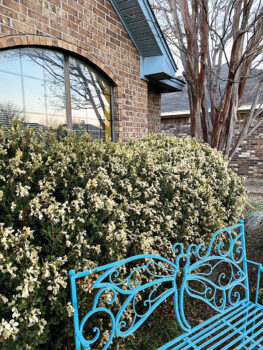 Janet Laminack, County Extension Agent-Horticulture
Janet Laminack, County Extension Agent-Horticulture
What just happened? It was crazy cold is what happened. Like you, I don’t put up with our sweltering summers to have to deal with that kind of cold nonsense. But surprise! So, what does this mean for our plants? In talking to my colleagues across the state, we came up with, “we don’t know yet.” That’s a great answer from some of the most knowledgeable horticulturists … oh, right, insert Aggie joke here.
It is frustrating to not know how this cold has or will affect our plants, but we just don’t have a reference point. It has never gotten this cold, for this long, at this time of the year in our recent history. Previous cold snaps have happened without much plant damage. However, the soil temperature was also really cold for several days this time and that will have an impact.
The discussion with my colleagues was about how cold can “such and such a plant” survive. Many of our plants are grown in much colder climates and thrive. However, with our warm winters, many of those plants were coming out of dormancy. Buds were swelling, flowers were blooming, sap was rising, birds were singing—all that stuff. That makes it all the more unknown in our part of the world.
So, for now, our best advice is to “live with the ugly” for a while. I have seen plants, trees, and shrubs that looked completely dead, but eventually bounced back. I have declared plants goners, only to see that they are thriving years later. That’s why we are recommending a “wait and see” approach. If the plant has died completely or some of it has died back, there’s nothing to be done about it right now. Pruning back should wait, at least for a couple more weeks.
Are you ready for my view into the magic ball, since I’m obviously so good at this sort of thing? I think we will see some ugly evergreen shrubs and trees for a while. Because those plants have foliage, they are more likely to desiccate or even experience physical damage. I predict that some fruit production may be hampered. We may not see it in our area, but I imagine some parts of Texas will see a loss of production.
I foresee a great replanting of winter vegetables such as spinach, lettuce, and other greens, in our home gardens, or at least mine. Some of our herbs and other perennials will have died back to the ground or given up completely. Plants in containers that were left outside will probably experience a lower survival rate than their cohorts in the ground.
Where I’m afraid we will see the biggest impact is going to be to our trees. This was probably a stressful event for trees, which have already endured drought, extreme heat, and flooding in recent years. Cumulative stress events such as these can take a toll even on our older, native trees. What makes it even more heartbreaking and confusing is that the impact probably won’t show up this season. Trees are a lot of things, but quick to respond is not one of their traits. Next year or the year after that, the damage will begin to show on our trees.
So besides wait and endure the ugly, what can you do? I would advise that you don’t do much. We do not want to create more stress on our plants. Things that can seem good, can cause stress such as watering too much or fertilizing. Certainly, our timing is going to be a bit different this spring. If you like to do planting, fertilizing, or weed control by a calendar date, that may not work. Pruning or trimming should wait as well. This week we have shared some videos on assessing freeze damage, along with some pointers on the Aggie Horticulture Facebook page. We may not have much advice, but rest assured you are not alone. As always, give us a call at 940-349-2892 or send us an email at Master.Gardener@dentoncounty.gov if you have specific questions or need to find the links to the aforementioned videos.
Texas A&M AgriLife Extension provides equal opportunities in its programs and employment to all persons, regardless of race, color, sex, religion, national origin, disability, age, genetic information, veteran status, sexual orientation, or gender identity. The Texas A&M University System, U.S. Department of Agriculture, and the County Commissioners Courts of Texas Cooperating.
